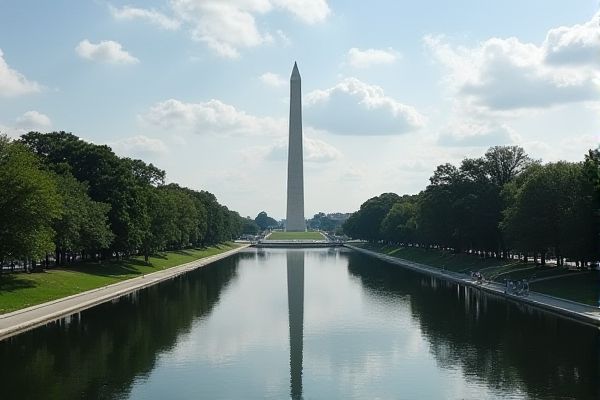
Banking and financial services in Washington: Major banks: Bank of America, Wells Fargo. Credit unions presence: Boeing Employees Credit Union. State taxes: No personal income tax. Sales tax: Ranges from 6.5% to 10.4%. Cashless transactions: Widely accepted. Online banking: Popular and accessible. Financial advisors: Plentiful in metro areas. Investment opportunities: Seattle tech startups. Home mortgage options: Competitive rates available. Cost of living: Higher in urban areas.
Major banks: Bank of America, Wells Fargo.
In Washington, major banks like Wells Fargo and Bank of America offer a wide range of financial services. Wells Fargo provides banking, investments, trust services, insurance, and mortgage services through numerous locations, including the Seattle Main branch, which offers lobby hours from Monday to Friday and various automated services. Bank of America, though not as extensively detailed in the sources, is a significant player in commercial banking, wealth management, and investment banking, with operations across the country, including in Washington state, following its expansion outside California.
Credit unions presence: Boeing Employees Credit Union.
Boeing Employees' Credit Union (BECU) stands as the largest credit union in Washington state and ranks as the fourth-largest in the United States. It proudly serves over 1 million members with comprehensive banking services, boasting no monthly fees and providing access to over 30,000 surcharge-free ATMs across the nation. Membership eligibility extends to residents, students, employees, and business owners in Washington state, as well as select counties in Oregon and Idaho, in addition to individuals affiliated with Boeing or particular organizations. For more detailed insights, you can read the full review at Bankrate, which highlights BECU's extensive offerings and membership benefits.
State taxes: No personal income tax.
Washington State offers a unique tax landscape as it does not levy a personal income tax, allowing residents to enjoy their earnings, including retirement benefits and military pensions, without state income deductions. This tax-friendly environment is tempered by a 7% tax on long-term capital gains exceeding $262,000. Furthermore, residents should consider the sales tax, which averages a notable 9.38% when state and local levies are combined. For more comprehensive information on this topic, the State Taxes Guide provides valuable insights into Washington's taxation system.
Sales tax: Ranges from 6.5% to 10.4%.
In Washington, the sales tax rate ranges from 6.5% to 10.4%, with the state rate being 6.5% and local municipalities adding up to an additional 3.9%, making the total tax rate vary by location. For more detailed information on how these rates apply in different regions, you can visit the Avalara Website, which provides a comprehensive breakdown of state and local sales tax rates.
Cashless transactions: Widely accepted.
In Washington, particularly in King County, cashless transactions are not widely accepted. A new law mandates that retail businesses must accept cash payments to ensure inclusivity for individuals without bank accounts or those who prefer to use cash. This regulation aligns with similar policies in other major cities like New York City, San Francisco, and Washington, D.C. For further details, you can read about this policy change on Axios, where the impact on local communities is discussed in depth.
Online banking: Popular and accessible.
In Washington, online banking has revolutionized how users interact with their finances, providing seamless and secure services that cater to modern needs. With features that allow individuals to view account information, transfer funds, and pay bills, these platforms ensure that financial management is accessible at any hour, from any location. Platforms like Washington Trust Bank's Digital Banking go a step further by offering customizable dashboards and advanced controls for card management, along with tools that deliver valuable financial insights. These enhancements empower users not only to track their spending and manage payments efficiently but also to set and achieve their personal savings goals with ease.
Financial advisors: Plentiful in metro areas.
Financial advisors are plentiful in the Washington, D.C. metro area, with firms like Armstrong Fleming & Moore, Pathstone Federal Street, and others offering personalized financial planning and investment strategies tailored to clients' needs. For those seeking guidance, a review of the Best Financial Advisors in the DC, MD, VA area is essential to find the right match for their financial goals and aspirations.
Investment opportunities: Seattle tech startups.
Seattle offers significant investment opportunities in tech startups, particularly in software and AI, with the city ranking third in the U.S. for software-as-a-service funding. It is home to prominent venture capital firms like Madrona Venture Group and Ignition Partners. To learn more about the city's emerging status in the tech ecosystem, visit GeekWire, where you can find comprehensive insights into Seattle's rise in early-stage software startup funding.
Home mortgage options: Competitive rates available.
In Washington, competitive mortgage rates are available, with 30-year fixed mortgage rates ranging from 6.58% to 7.00% and 15-year fixed rates from 5.88% to 6.50%, depending on the source and date. Homebuyers can also explore programs like Home Advantage and House Key Opportunity for reduced interest rates, especially for first-time buyers and those meeting specific income and credit criteria. For a comprehensive understanding of the current rates and tailored advice, it is worthwhile to visit Bankrate.
Cost of living: Higher in urban areas.
The cost of living in Washington, particularly in urban areas like Seattle, is significantly higher than the national average. Housing costs are 29% higher, transportation is 27% higher, and healthcare is 20% higher, all contributing to the state's overall 17% higher cost of living compared to the national average. For detailed insights and comparisons, the Cost of Living Calculator offers valuable resources for those considering a move to Washington.
